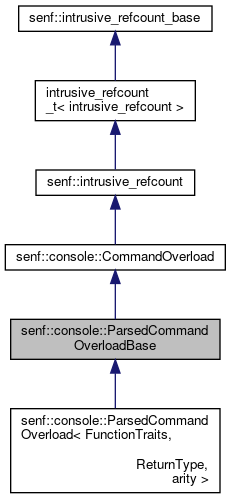senf::console::ParsedCommandOverloadBase Class Reference
CommandOverload implementation with automatic argument parsing. More...
#include <senf/Utils/Console/ParsedCommand.hh>
Inheritance diagram for senf::console::ParsedCommandOverloadBase:

Public Types | |
| typedef boost::intrusive_ptr< ParsedCommandOverloadBase > | ptr |
 Public Types inherited from senf::console::CommandOverload Public Types inherited from senf::console::CommandOverload | |
| typedef boost::intrusive_ptr< CommandOverload > | ptr |
| typedef boost::intrusive_ptr< CommandOverload const > | cptr |
 Public Types inherited from senf::intrusive_refcount_base Public Types inherited from senf::intrusive_refcount_base | |
| typedef unsigned | refcount_t |
Public Member Functions | |
| detail::ArgumentInfoBase & | arg (unsigned n) const |
| void | doc (std::string const &d) |
 Public Member Functions inherited from senf::console::CommandOverload Public Member Functions inherited from senf::console::CommandOverload | |
| virtual | ~CommandOverload () |
| void | execute (boost::any &rv, std::ostream &os, ParseCommandInfo const &command) |
| Call the overload. More... | |
| void | operator() (boost::any &rv, std::ostream &os, ParseCommandInfo const &command) |
| Call the overload. More... | |
| unsigned | numArguments () const |
| Number of arguments this overload takes. More... | |
| void | argumentDoc (unsigned index, ArgumentDoc &doc) const |
| Get information on argument index. More... | |
| std::string | doc () const |
| Get overload documentation. More... | |
| OverloadedCommandNode & | node () const |
| Access owning node. More... | |
| unsigned | overloadIndex () const |
| Get index of overload in it's OverloadedCommandNode. More... | |
 Public Member Functions inherited from senf::intrusive_refcount_base Public Member Functions inherited from senf::intrusive_refcount_base | |
| virtual | ~intrusive_refcount_base () |
| refcount_t | refcount () const |
| bool | is_shared () const |
Protected Member Functions | |
| ParsedCommandOverloadBase () | |
| template<class Type > | |
| void | addParameter () |
 Protected Member Functions inherited from senf::console::CommandOverload Protected Member Functions inherited from senf::console::CommandOverload | |
| CommandOverload () | |
| virtual void | v_execute (boost::any &rv, std::ostream &os, ParseCommandInfo const &command) const =0 |
| Execute the overload. More... | |
 Protected Member Functions inherited from senf::intrusive_refcount Protected Member Functions inherited from senf::intrusive_refcount | |
| intrusive_refcount () | |
 Protected Member Functions inherited from intrusive_refcount_t< intrusive_refcount > Protected Member Functions inherited from intrusive_refcount_t< intrusive_refcount > | |
| intrusive_refcount_t () | |
 Protected Member Functions inherited from senf::intrusive_refcount_base Protected Member Functions inherited from senf::intrusive_refcount_base | |
| intrusive_refcount_base () | |
| void | add_ref () |
| bool | release () |
Detailed Description
CommandOverload implementation with automatic argument parsing.
ParsedCommandOverloadBase implements a CommandOverload implementation supporting automatic parsing of arguments. This is not a node, it's a CommandOverload which is then added to an OverloadedCommandNode instance.
Automatic argument parsing and return value processing consists of several components:
- Adding argument parsing callbacks to the tree Adding overload instances to the tree
- (Advanced) Custom parameter parsers
- (Advanced) Custom return-value formatters
Adding argument parsing callbacks to the tree
To add overloads to the tree, use the senf::console::factory::Command factory:
namespace fty = senf::console::factory;
std::string taskStatus(int id);
There are quite a number of additional parameters available to be set. These parameters are
documented in ParsedArgumentAttributor. Parameters are set by adding them as additional
calls after adding the node:
.doc("Query the current task status")
description = "numeric id of task to check, -1 for the current task."
default_value = -1 ) );
You may also add an additional \c std::ostream & Argument as first argument to the
callback. If this argument is present, the stream connected to the console which issued the
command will be passed there. This allows writing arbitrary messages to the console.
Additionally, overloading is supported by registering multiple commands under the same
name. So, elaborating on above example:
std::string taskStatus(int id);
std::string taskStatus(std::string const & name);
&taskStatus))
.doc("Query the current task status")
.overloadDoc("Query status by id")
description = "numeric id of task to check, -1 for the current task."
default_value = -1 ) );
&taskStatus))
.overloadDoc("Query status by name")
description = "name of task to check" ) );
We can see here, that taking the address of an overloaded function requires a cast. If you
can give unique names to each of the C++ overloads (not the overloads in the console), you
should do so to make the unwieldy casts unnecessary.
Custom parameter parsers
By default, parameters are parsed using \c boost::lexical_cast and therefore using \c
iostreams. This means, that any type which can be read from a stream can automatically be
used as argument type.
However, argument parsing can be configured by specializing
senf::console::ArgumentTraits. See that class for more information.
Custom return-value formatters
By default, return values are streamed to an ostream. This automatically allows any
streamable type to be used as return value. To add new types or customize the formating, the
senf::console::ReturnValueTraits template needs to be specialized for that type. See
that class for more information.
Definition at line 126 of file ParsedCommand.hh.
Member Typedef Documentation
◆ ptr
| typedef boost::intrusive_ptr<ParsedCommandOverloadBase> senf::console::ParsedCommandOverloadBase::ptr |
Definition at line 130 of file ParsedCommand.hh.
Constructor & Destructor Documentation
◆ ParsedCommandOverloadBase()
|
protected |
Member Function Documentation
◆ addParameter()
template<class Type >
|
protected |
◆ arg()
| detail::ArgumentInfoBase& senf::console::ParsedCommandOverloadBase::arg | ( | unsigned | n | ) | const |
◆ doc()
| void senf::console::ParsedCommandOverloadBase::doc | ( | std::string const & | d | ) |
The documentation for this class was generated from the following files: